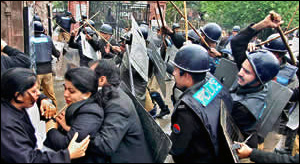Since the earliest days after 9/11, the White House has called Pakistan President Pervez Musharraf a key ally in the war on terror, even though he acts against the Taliban and other jihadists within his country only when forced to by the U.S. And predictably, shortly before Dick Cheney landed for talks on Feb. 26, Pakistan announced the capture of Mullah Obaidullah, a senior Taliban leader and deputy of chief Mullah Omar.
But the White House signaled its growing impatience with his failure to crack down on Islamic extremists. The vice president made it clear: American military assistance to Islamabad is at risk unless Bush certifies that the Pakistani government is making all possible efforts to curtail Taliban activity on its soil.
There is little chance Musharraf will make substantive changes. Three strands of jihad converge and feed off one another in Pakistan's radicalized Sunni mosques, madrasas and other religious institutions. This rather arbitrary division of jihadists into the good (regional), the bad (domestic), and the ugly (global) has led the Musharraf government to adopt incoherent, conflicting policies. It has also meant that the crackdown on militant groups is selective, reactive, and sporadic. Whereas the "ugly" -- al-Qaeda and the Taliban -- are pitched against the 70,000 or so troops stationed in the tribal areas, their ancillary domestic outfits have only faced cosmetic bans and partial, on-off police action. The leaders of the "good" jihad meanwhile lead an active and highly visible public life, appearing in the electronic media, running radical madrasas, and regularly issuing calls for jihad from the pulpit. Their organizations, too, remain as active as ever, and almost all the jihadi organizations banned by the government are plying the trade by other names.
 | |
Protesters fight police following the firing of Pakistan's Supreme Court chief justice PHOTO: Pakistan Times
|
At the same time,
Musharraf is facing his biggest domestic political crisis because of his abrupt March 9 suspension of Supreme Court chief justice Iftikhar Mohammad Chaudhry. Attorneys protested and fought police in the streets for days afterwards. Why was he fired? The official charges listed minor corruption offenses, such as family use of a government car, but the real reason, critics say, is that he could not be trusted to rule in Musharraf's favor on important cases about to be heard by the court, including the legality of Musharraf running for another term as president
|






